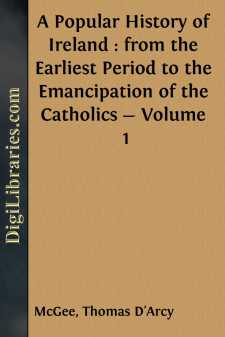History
- Africa 30
- Americas (North Central South West Indies) 50
- Ancient 68
- Asia 58
- Australia & New Zealand 8
- Canada 41
- Caribbean & West Indies 1
- Civilization 20
- Eastern Europe 12
- Europe
- Expeditions & Discoveries 60
- General 77
- Historical Geography 1
- Jewish 9
- Latin America 3
- Medieval 8
- Middle East 13
- Military 248
- Revolutionary 8
- Study & Teaching 5
- United States 353
- Western Europe 56
- World 13
Europe Books
Sort by:
by:
Alfred Sidgwick
INTRODUCTORY I was once greatly impressed by a story of an officer in the German army, who told his English hostess that he knew the position of every blacksmith's forge in Yorkshire. I wondered at the time how many officers in the English army had learned where to find the blacksmiths' forges in Pomerania. But those are bygone days. Most of us know more about Germany now than we do about our...
more...
THE FIRST CHAPTER. Hitherto haue we spoken of the inhabitants of this Ile before the comming of Brute, although some will néeds haue it, that he was the first which inhabited the same with his people descended of the Troians, some few giants onelie excepted whom he vtterlie destroied, and left not one of them aliue through the whole Ile. But as we shall not doubt of Brutes comming hither, so may we...
more...
CHAPTER I ACROSS THE REDEEMED LANDS It is unwise, generally speaking, to write about countries and peoples when they are in a state of political flux, for what is true at the moment of writing may be misleading the next. But the conditions which prevailed in the lands beyond the Adriatic during the year succeeding the signing of the Armistice were so extraordinary, so picturesque, so wholly without...
more...
by:
Various
The Memoirs, of which a new translation is now presented to the public, are the undoubted composition of the celebrated princess whose name they bear, the contemporary of our Queen Elizabeth; of equal abilities with her, but of far unequal fortunes. Both Elizabeth and Marguerite had been bred in the school of adversity; both profited by it, but Elizabeth had the fullest opportunity of displaying her...
more...
Ireland, lifting herself from the dust, drying her tears, and proudly demanding her legitimate place among the nations of the earth, is a spectacle to cause immense progress in political philosophy. Behold a nation whose fame had spread over all the earth ere the flag of England had come into existence. For 500 years her life has been apparently extinguished. The fiercest whirlwind of oppression that...
more...
by:
John Taylor
eader, these Travels of mine into Scotland, were not undertaken, neither in imitation, or emulation of any man, but only devised by myself, on purpose to make trial of my friends both in this Kingdom of England, and that of Scotland, and because I would be an eye-witness of divers things which I had heard of that Country; and whereas many shallow-brained Critics, do lay an aspersion on me, that I was...
more...
by:
Catherine Clive
INTRODUCTION Among other things, the licensing act of 1737 stipulated that Covent Garden and Drury Lane exclusively were the patented and licensed theaters (respectively) in London, a fact directly related to the revolt of prestigious players six years later. Although there were sporadic performances of "legitimate" drama in unlicensed playhouses between 1737 and 1743, full-time professional...
more...
The present is the best collected edition of the important works of Schiller which is accessible to readers in the English language. Detached poems or dramas have been translated at various times since the first publication of the original works; and in several instances these versions have been incorporated into this collection. Schiller was not less efficiently qualified by nature for an historian...
more...
INTRODUCTION. The memory of no English sovereign has been so execrated as that of Mary Tudor. For generations after her death her name, with its horrid epithet clinging round it like the shirt of Nessus, was a bugbear in thousands of Protestant homes. It is true that nearly 300 persons were burnt at the stake in her short reign. But she herself was more inclined to mercy than almost any of her...
more...
RECOLLECTIONS OF THE PARISIAN INSURRECTION. The desire of appreciating de visu the results of a five month's siege in a town of two million inhabitants, unexampled in the annals of humanity, made me leave London on the twentieth of March. Hardly landed in the Capital of France which I thought of finding tranquil and occupied in exercising its genius in repairing the disasters caused by the enemy,...
more...











